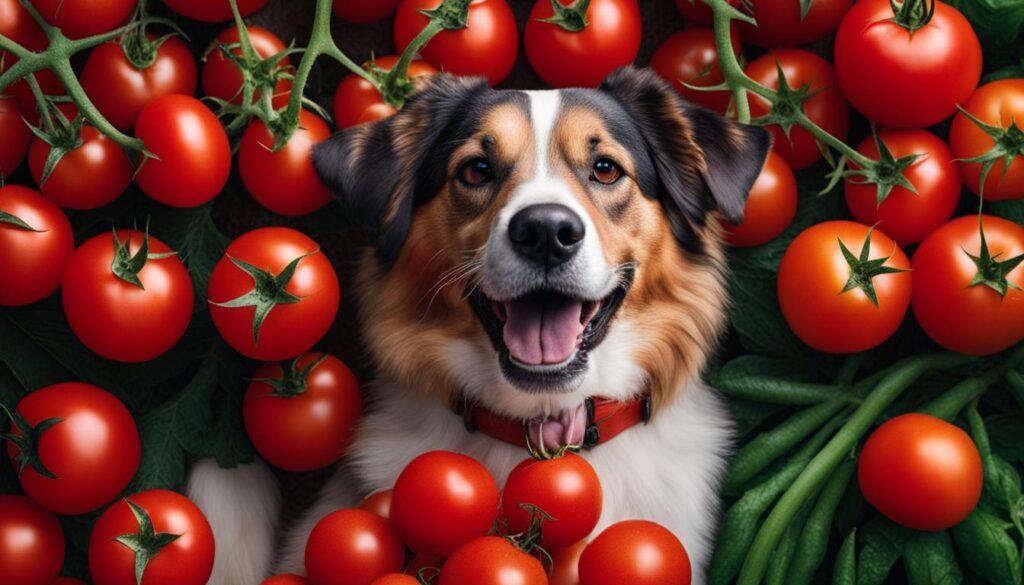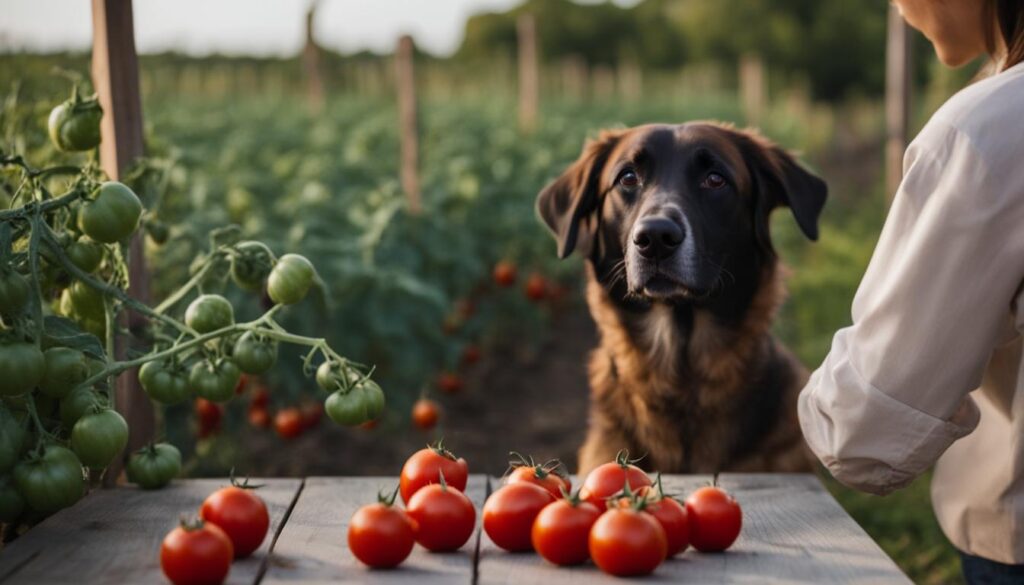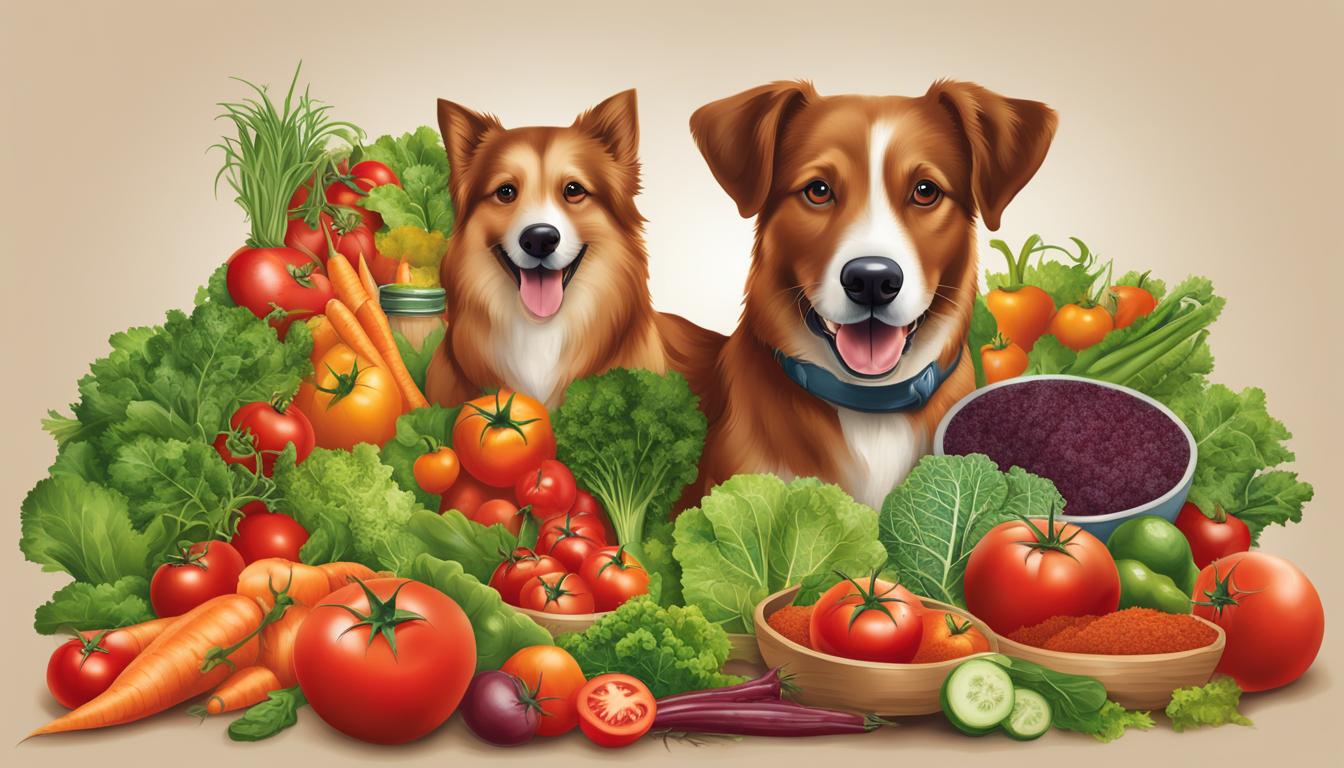Have you ever wondered if it’s safe to share your juicy tomatoes with your furry friend? Well, the answer is yes, but with a few precautions. While tomatoes can be a healthy addition to your dog’s diet, there are some risks you should be aware of. In this article, we will explore the health benefits and potential dangers of feeding tomatoes to your beloved canine companion.
Key Takeaways:
- Dogs can eat tomatoes in moderation, but precautions should be taken.
- Unripe tomatoes and the leaves and stems of the tomato plant can be toxic to dogs.
- Tomatine poisoning is rare in dogs but can occur if they consume a large quantity of green tomatoes.
- Ripe tomatoes can provide health benefits such as fiber, antioxidants, vitamins, and minerals.
- It’s important to prepare tomatoes correctly by removing the green parts and feeding them in moderation.
Are Tomatoes Good for Dogs?
Ripe tomatoes can be a healthy addition to your dog’s diet. They offer a range of benefits, including fiber, antioxidants, vitamins (A, C, K), minerals (potassium), and folate. Tomatoes can support digestion, immune health, muscle function, and tissue growth. However, it’s important to feed tomatoes to your dog in moderation due to their acidity, and dogs with allergies or digestive issues may have adverse reactions. To ensure safety and promote optimal health, here are some key points to consider:
- Choose ripe tomatoes: Ripe tomatoes are safe for dogs to consume and contain higher levels of nutrients compared to unripe ones. Look for tomatoes that are firm and have a rich, red color.
- Remove green parts: Before feeding tomatoes to your dog, make sure to remove the stems and leaves. These parts contain higher levels of tomatine, which can be toxic if consumed in large amounts.
- Feed in moderation: While tomatoes can be beneficial, they should be given in moderation due to their acidic nature. Excessive consumption may lead to digestive upset or discomfort.
“Ripe tomatoes offer a range of health benefits for dogs, including essential vitamins and minerals. However, it’s important to remember that each dog is unique, and some may have allergies or sensitivities to tomatoes. It’s always best to consult with your veterinarian before introducing any new food into your dog’s diet.”
To incorporate tomatoes into your dog’s diet, you can consider various options. You can chop them into small pieces and offer them as a treat or mix them into homemade dog food recipes. Remember to monitor your dog for any signs of adverse reactions, such as gastrointestinal upset or allergic symptoms. If you have concerns about your dog’s health or dietary needs, it’s always recommended to seek professional advice from a veterinarian.
| Benefits of Tomatoes for Dogs | Serving Suggestions |
|---|---|
| • Fiber for digestion | • Chopped as a treat |
| • Antioxidants for immune health | • Mixed into homemade dog food |
| • Vitamins (A, C, K) for overall health | |
| • Minerals (potassium) for muscle function | |
| • Folate for tissue growth |

By following these guidelines and considering your dog’s individual needs, you can safely share the benefits of ripe tomatoes with your furry friend. Remember, a well-balanced and varied diet is key to supporting your dog’s overall health and well-being.
Tomato Allergies and Risks for Dogs
While tomatoes can offer health benefits to dogs when consumed in moderation, it’s important to be aware of potential allergies and risks associated with these red fruits. Some dogs may have allergies to tomatoes, which can cause symptoms such as hives, coughing, wheezing, and difficulty breathing. It’s crucial to monitor your dog for any signs of allergic reactions after introducing tomatoes to their diet.
Additionally, certain parts of the tomato plant, such as the stems, leaves, and unripe tomatoes, can contain higher levels of a compound called tomatine. Ingesting large amounts of these green tomatoes or plant parts can be toxic to dogs. Symptoms of tomatine poisoning include loss of coordination, loss of appetite, muscle weakness, hypersalivation, dilated pupils, tremors, seizures, lethargy, abdominal pain, cardiac effects, and gastrointestinal upset. However, it’s important to note that tomatine poisoning is rare in dogs and is usually not fatal.
Puppies can eat ripe tomatoes in moderation, but it’s advisable to avoid giving them green tomatoes due to their higher tomatine content. As puppies’ digestive systems are still developing, it’s essential to introduce new foods slowly and observe any adverse reactions. If you have concerns about your puppy’s tomato consumption, it’s always best to consult with a veterinarian for personalized advice.
Allergic Reactions to Tomatoes in Dogs:
- Hives
- Coughing
- Wheezing
- Difficulty breathing
Symptoms of Tomatine Poisoning in Dogs:
- Loss of coordination
- Loss of appetite
- Muscle weakness
- Hypersalivation
- Dilated pupils
- Tremors
- Seizures
- Lethargy
- Abdominal pain
- Cardiac effects
- Gastrointestinal upset
It’s crucial to prioritize your dog’s well-being and monitor their response to tomatoes. When in doubt, always consult with a veterinarian who can provide expert guidance based on your dog’s specific needs and health condition.
Tomato Products and Dogs
While ripe tomatoes are generally safe for dogs, it’s important to exercise caution when it comes to tomato products. Certain tomato-based products can contain ingredients that may be harmful to dogs. Tomato sauce, for example, often contains additives like garlic and onions, which can be toxic to canine companions. It’s best to avoid giving dogs tomato sauce, tomato soup, or ketchup, as they may have high sugar or salt content as well.
If you’re cooking for your dog and want to incorporate tomatoes, it’s crucial to use fresh, ripe tomatoes and avoid seasonings or ingredients that can be unsafe. The focus should be on providing a natural and balanced diet. Homemade dog food recipes can include tomatoes as a source of nutrients, but it’s important to use them appropriately and in moderation.
When preparing tomatoes for your dog, remember to remove all green parts, including stems and leaves. These parts can contain higher levels of tomatine, a substance that can be toxic to dogs when consumed in large quantities. By practicing these precautions, you can ensure that your dog enjoys the benefits of tomatoes without any unnecessary risks.
Overall, while ripe tomatoes can be a healthy addition to your dog’s diet, it’s essential to be aware of the potential dangers associated with tomato products and take the necessary steps to keep your furry friend safe.
| Safe | Avoid |
|---|---|
| Raw ripe tomatoes | Tomato sauce |
| Cooked ripe tomatoes | Tomato soup |
| Tomato chunks in homemade dog food | Ketchup |
Section 5: Safely Sharing Tomatoes with Dogs
When it comes to sharing tomatoes with your furry friend, it’s essential to do so safely. Tomatoes can be a healthy addition to your dog’s diet, but it’s important to follow these guidelines to ensure their well-being.
Choose Ripe Tomatoes and Remove Green Parts
To start, select ripe tomatoes that are free from any signs of mold or spoilage. These tomatoes are safe for dogs to consume and contain beneficial nutrients. However, it’s crucial to remove any green parts, including the stems and leaves. These components contain higher levels of tomatine, which can be toxic to dogs if ingested in large amounts. By carefully preparing the tomatoes, you can minimize the risk of any adverse reactions.
Cut Into Bite-Size Pieces and Monitor Reactions
After choosing ripe tomatoes and removing the green parts, it’s recommended to cut them into small, bite-size pieces. This makes it easier for your dog to chew and digest the tomatoes. Start by offering a small amount to gauge how your dog reacts. Monitor for any signs of digestive issues or allergic reactions, such as vomiting or itching. If there are no adverse reactions, you can gradually increase the portion size. However, if you notice any negative symptoms, it’s best to consult with your veterinarian.
Incorporating Tomatoes into Homemade Dog Food
If you enjoy preparing homemade meals for your dog, tomatoes can be a tasty addition. However, it’s essential to use them appropriately and in moderation. Consider incorporating tomatoes into balanced recipes that include other dog-friendly ingredients. Remember to follow the same guidelines of selecting ripe tomatoes, removing the green parts, and monitoring your dog’s reactions. By incorporating tomatoes into homemade dog food, you can provide variety and additional nutrients to their diet.

Remember, every dog is unique, and their dietary needs may vary. While tomatoes can provide health benefits, they should be given in moderation as part of a well-balanced diet. Always consult with your veterinarian before introducing any new foods to your dog’s diet, especially if your dog has underlying health conditions or allergies. By taking these precautions, you can safely share tomatoes with your furry friend and add some variety to their meals.
Keeping Dogs Away from Tomatoes
If you want to ensure your canine companion stays safe from the potential risks associated with tomatoes, it’s important to take some precautions to keep them away. Here are a few tips to help you protect your dog:
- Avoid planting tomato plants in your garden or keep them fenced off to prevent dogs from accessing them. This will help reduce the temptation for dogs to chew on the leaves, stems, or unripe tomatoes.
- When storing tomatoes indoors, make sure they are stored in a location that is out of reach for your dog. This will help prevent accidental ingestion of unripe or potentially harmful tomatoes.
- Be cautious when cooking with tomatoes in the presence of your dog. Dogs can sometimes be curious and might try to help themselves to the ingredients. Keep a close eye on your furry friend to prevent them from accessing tomatoes during meal preparation.
By following these simple steps, you can minimize the risks associated with tomatoes and ensure the well-being of your beloved pet.

Table: Common Risks Associated with Tomatoes for Dogs
| Risk | Description |
|---|---|
| Tomatine Poisoning | Ingesting large amounts of unripe tomatoes can lead to tomatine poisoning. Symptoms include loss of coordination, muscle weakness, seizures, and gastrointestinal upset. |
| Allergic Reactions | Some dogs may have allergies to tomatoes, resulting in symptoms like hives, coughing, wheezing, and difficulty breathing. |
| Ingestion of Leaves and Stems | The leaves and stems of the tomato plant contain higher levels of tomatine, which can be toxic to dogs if consumed in large amounts. |
“Prevention is key when it comes to keeping your dog safe around tomatoes. Taking simple measures like securing your garden and storing tomatoes properly can go a long way in protecting your furry friend.” – Dr. Amanda Wilson, Veterinarian
Conclusion
Now you know the answer to the burning question: can dogs eat tomatoes? The good news is that yes, they can! Ripe tomatoes can be a healthy addition to your dog’s diet, providing them with fiber, antioxidants, and essential vitamins and minerals. However, it’s important to be cautious and mindful of potential risks.
While tomatine poisoning is rare in dogs, it’s still crucial to avoid feeding them unripe tomatoes and the leaves and stems of the tomato plant. These parts contain higher levels of tomatine, which can be toxic in large amounts. Additionally, some dogs may have allergies to tomatoes, so it’s essential to monitor them for any signs of allergic reactions.
To safely share tomatoes with your furry friend, choose ripe tomatoes, remove any green parts, and cut them into small, bite-size pieces. Start with small portions to observe how your dog reacts and gradually increase if there are no issues. Remember, moderation is key when incorporating tomatoes into your dog’s diet, and it’s always best to consult with your veterinarian before introducing any new foods.
So, go ahead and share a juicy tomato with your canine companion, as long as it’s ripe, prepared correctly, and given in moderation. Remember, a well-balanced diet is essential for your dog’s health and happiness!
FAQ
Can dogs eat tomatoes?
Yes, dogs can eat tomatoes in small amounts, but there are risks associated with unripe tomatoes and the leaves and stems of the tomato plant.
What are the risks of feeding dogs unripe tomatoes?
Unripe tomatoes and the green parts of the tomato plant contain tomatine, which can be toxic to dogs if consumed in large amounts. Symptoms of tomatine poisoning include loss of coordination, muscle weakness, tremors, seizures, and gastrointestinal upset.
Are ripe tomatoes safe for dogs?
Ripe tomatoes are non-toxic and can be included in a dog’s diet. They contain fiber, antioxidants, vitamins, and minerals that can support digestion, muscle function, immune health, and tissue growth.
Can dogs be allergic to tomatoes?
Yes, some dogs may have allergies to tomatoes, which can cause symptoms like hives, coughing, wheezing, and difficulty breathing. It’s important to monitor your dog for any signs of allergic reactions when introducing tomatoes into their diet.
Can puppies eat tomatoes?
Puppies can eat ripe tomatoes in moderation, but it’s best to avoid giving them green tomatoes or any parts of the tomato plant that contain higher levels of tomatine.
Can dogs eat tomato sauce, tomato soup, or ketchup?
It’s best to avoid giving dogs tomato sauce, tomato soup, or ketchup as they often contain additives, high sugar, or salt content that can be harmful to dogs. When cooking for dogs, it’s important to use fresh, ripe tomatoes and avoid unsafe seasonings or ingredients.
How should tomatoes be prepared for dogs?
Choose ripe tomatoes, remove all green parts (stems, leaves), and cut them into small, bite-size pieces. Start with small amounts to observe any adverse reactions and gradually increase portions if there are no problems.
What should I do if my dog shows signs of tomato allergies or tomatine poisoning?
If your dog shows signs of tomato allergies or tomatine poisoning, such as severe allergic reactions or severe symptoms of tomatine poisoning, it’s important to consult a veterinarian immediately for proper diagnosis and treatment.
How can I prevent my dog from accessing unripe tomatoes?
To prevent dogs from ingesting too many tomatoes or accessing unripe tomatoes, it’s important to keep your garden fenced off or protect tomato plants from being chewed by dogs. Inside the house, store tomatoes in a location that is out of reach for dogs.
Can I include tomatoes in homemade dog food recipes?
Yes, tomatoes can be included in homemade dog food recipes, but it’s important to use them appropriately and in moderation. Always consult with a veterinarian before introducing any new foods to your dog’s diet.





